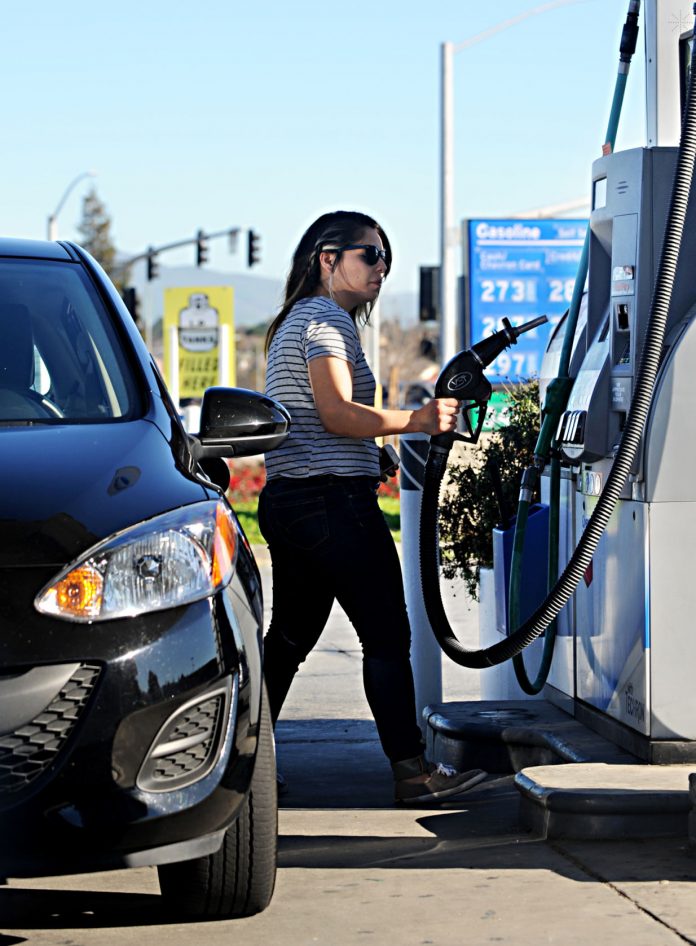
San Jose resident Mikki Fillhouer is driving to Hollister more, and it’s all because of the cheaper gas prices.
Fillhouer, 71, visits the area to see her son, Joe Mazzulla, and she’s making the trip more often now that gas is $2.27 a gallon and filling the tank of her white Chrysler 300 is $39 instead of $60.
“I typically wouldn’t make this trip too often because of the gas,” said Fillhouer as she filled her tank at Ranch Gas & Food on 105 San Felipe Road.
More oil exploration in the United States—largely through fracking crude oil that isn’t obtainable under normal drilling methods—paired with less demand in Europe and Asia has driven the price down, said Graham Mackie, co-owner of Hollister-based Dassel’s Petroleum, Inc.
“The cheaper it is, the more people will tend to use it because they can afford it,” Mackie said. “You take the average person in Hollister who commutes to San Jose—which is the majority of our people—and it’s a huge benefit.”
On Monday, at least four gas stations less than a mile from downtown Hollister displayed prices of $2.27 per gallon for customers paying in cash.
The increase in oil production in the United States caused imports to drop 50 percent in 2014, Mackie said. But not everyone thinks the increased production is good. Mary Hsia-Coron participated in the “Yes on Measure J” campaign, which passed in November and allows conventional drilling to continue in most areas of the county but bans or phases out enhanced extraction––such as fracking, cyclic steaming and well acidizing—starting Jan 1.
Hsia-Coron worries about the long-term effects of using non-renewable resources so she drives an entirely electric car called a Nissan LEAF, which is charged with energy produced by her solar rooftop in Aromas.
“Climate change is a serious matter,” Hsia-Coron said. “Even if the price of gas is fairly low, there are other good reasons to not be dependent on fossil fuels.”
Hsia-Coron is also concerned that certain oil extraction techniques will affect drinking water and the environment, but Mackie is glad to see the nation move away from dependence on countries that “also fund terrorist groups, giving us problems in Europe right now,” he said.
“It’s just my point of view that if we can build something or have something produced in the United States, it just makes it better for this country,” Mackie said.
On Friday, the cost of crude oil was $47.87 a barrel at about 2 p.m. east coast time, Mackie said. That number was as high as $110 per barrel in September of 2014, Mackie explained.
“It’s fluctuating quite a bit on a daily basis,” he said. “Where it goes, I would say, is fairly hard to project. But it’s at a point right now where we’re going to see good prices at the pump for some time.”
Just because the price of crude oil is down doesn’t mean Mackie’s business—which sells propane, gasoline and diesel to commuters, people in the agricultural industry and commercial drivers—is taking a profit cut.
“It’s good for us, too,” Mackie said, noting that the company has to make its own purchases before the business can sell it to customers.
Back at Ranch Gas, where Fillhouer filled up her car Monday afternoon, San Juan Bautista resident Mirella Serrano, 37, filled the tank of her gas-guzzling Ram 2003 pickup truck and celebrated the change in prices.
“It’s good,” said Serrano in Spanish. “I’m driving more and spending less.”









